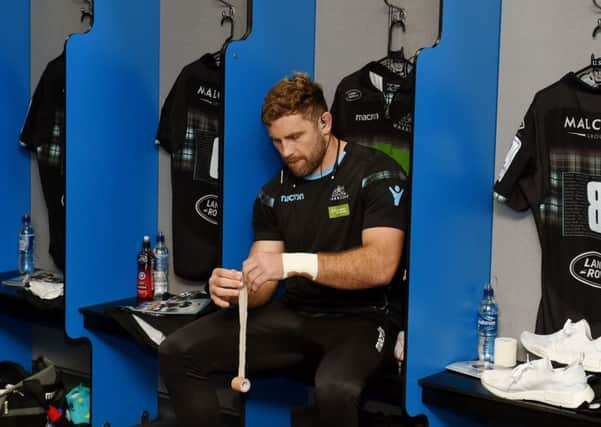Glasgow captain Callum Gibbins on learning lessons of Saracens defeats


Something has to change if the Warriors are to register their first win over Saracens after three defeats in the past three seasons. The two teams met in the 2017 quarter-finals, again at Allianz Park, and Saracens won at a canter, 38-13, the final score only looking respectable after Ryan Wilson snatched a try at the death. The English side even beat Glasgow at Scotstoun 13-3 in the opening round this season, a tough, tousy affair with limited opportunities for both sides.
Saracens have scored 38 points against Glasgow in each of their last two home meetings, while Glasgow have scored 13 and 19. You might think that Glasgow need a re-think, a tweak here or there, but Gibbins insists otherwise.
Advertisement
Hide AdAdvertisement
Hide Ad“When they [Glasgow] went down in 2017 it was quite a tough game for them [38-13],” the Kiwi flanker argues, “and then there was the one in January [38-19].
“I don’t think we need to change too much, to be honest. When we play the style of rugby we like to, when we play it fast and have got the ball, we’re pretty hard to handle.
“I don’t think we’ll be changing too much in the way we play because if you change too many things you run the risk of not being so clear. You don’t get on with the job you’ve been doing most of the year.
“In the first half [of the January pool match] we played with a lot of tempo. We were quite accurate in how we wanted to play and we held on to the ball really well.
“Against a side with so many international players like Saracens, that’s what you need to do. You’ve got to starve them of the ball, and when you have it, you’ve got to play well with it.
“In the second half, we were a bit off there. It was pretty even up until half-time and then in the second half they put us under pressure.”
That is what Saracens do, it is their MO, pressure is their weapon of choice. They back you into a corner with their kick game and strong arm defence and then challenge you to get out of it without making a mistake. It isn’t pretty but it works pretty well for the big-spending Londoners.
With a core of England players in their ranks, only time will tell if last weekend’s second half at Twickenham has done anything more than superficial damage to their confidence, especially that of the emotionally charged leader Owen Farrell. The stand-off and 2017 European Player of the Year endured something of a second-half meltdown which was started by Scotland captain Stuart McInally’s first-half charge down and his subsequent inability to chase down a hooker in 50 metres of space.
Advertisement
Hide AdAdvertisement
Hide AdHe is not the only Saracen stalwart who wears his heart on his sleeve. The peerless Maro Itoje made few fans at Scotstoun when he celebrated a Glasgow “try” that he knew had been disallowed a few seconds before that truth dawned on the celebrating Warriors players.
In fact Saracens are in danger of replacing Munster in Glasgow’s little black book of teams they’d most like to crush and if Glasgow do lose on Saturday it won’t be for the want of effort.
“It’s the Heineken Cup, the best competition in Europe so it’s going to be heated,” counters Gibbins. “There’s always that Scottish/English rivalry as well. Both teams will be well up it for, as they should be.
“When you’re out there trying to stop guys who are running at you, or you’re trying to run over someone, it gets pretty heated. But I think it’s good for the game.”
The good news for Glasgow is that Stuart Hogg may be back in harness, rated a “strong chance” by coach Dave Rennie last week, and George Horne, who offers a real point of difference, may join him. Horne is lightning quick around the base and a handy weapon if Glasgow stick to their quick, handling game without, if it’s possible, the plethora of mistakes that seem to come as part of the package.
“The key is holding on to the ball and looking after it,” said Gibbins. “You’ve got to do things well and be accurate, across the whole team. The last time out in the Pro14 our handling errors were up around ten or 12. We need to bring them down below ten.
“If we can hold on to the ball and not cough it up, that’s how you stress teams. Once you’ve done that for 60 minutes, there’s only one thing that’s going to prevail and that’s your fitness. Scotland as a whole is a pretty fit nation, the national side is pretty fit and we train really hard on our fitness here as well.”
So, more of the same come Saturday, only better. It is what Glasgow have been aiming at all season although it’s been a while since they hit the heights.